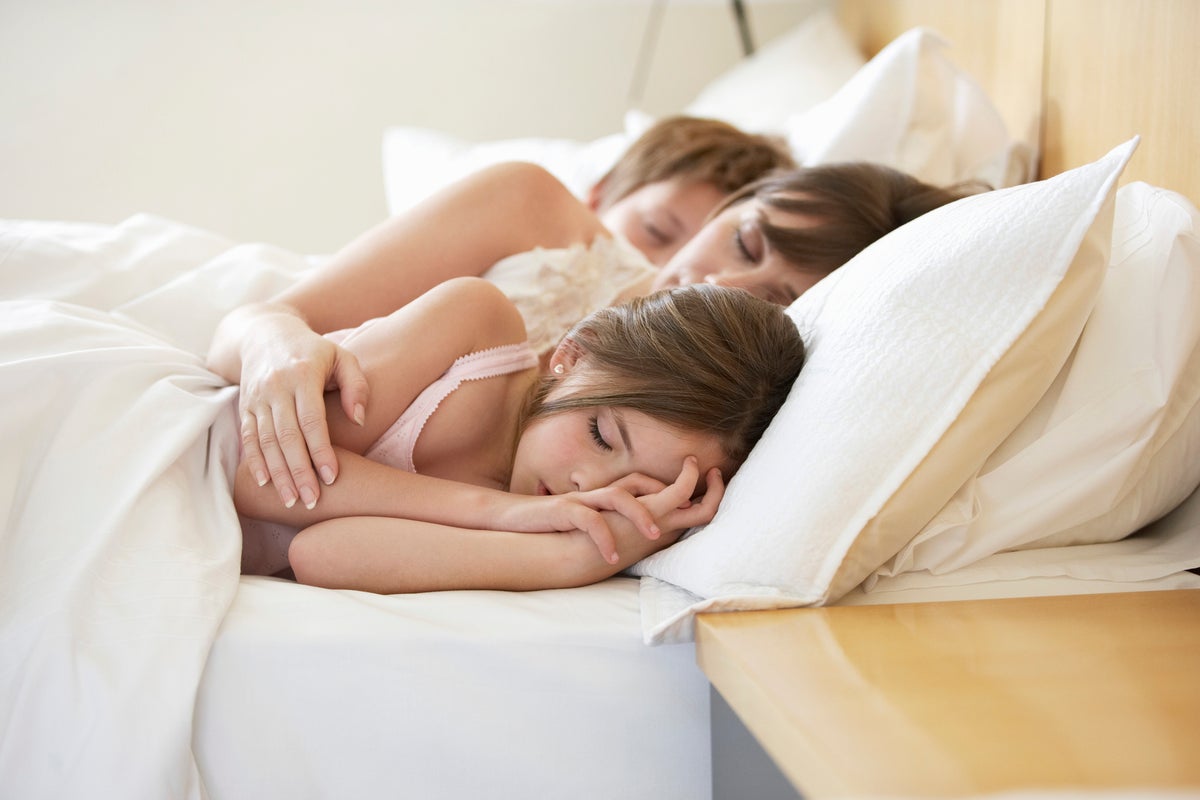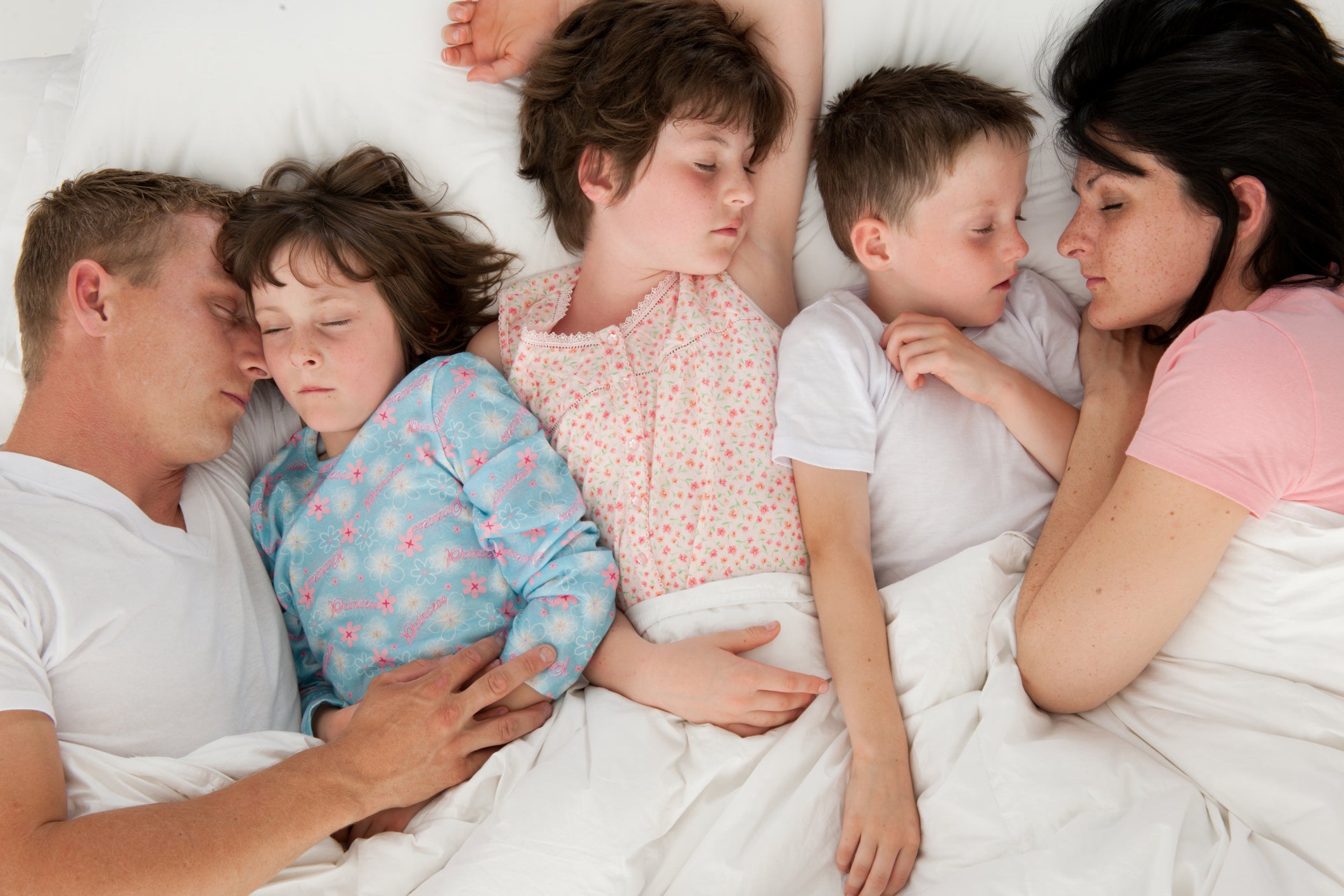
I remember the day I bought my super king size bed. It was a game-changer. I could co-sleep with my two children, Lola and Liberty, then aged three and one, without falling off the bed. I’d always thought sharing a bed with my kids was such a natural idea; it’s what many animals do in the wild. Of course, some people judged me: “You need headspace from them at night – some ‘me time’”; “It’s important for their independence that they have their own beds and bedrooms”; “It’s just not healthy”; “They’ll get separation anxiety”.
In my mind, though, it wouldn’t be long until my children were off having sleepovers with their friends and leaving the nest – so why not keep them snuggling up to me for as long as possible? I had no partner to consider. I am a single mum. So what was stopping me from sharing my bed for a heavenly connection? But little did I know that, five years down the line, co-sleeping with my children, now aged six and eight, would be a total nightmare. I feel I’ve been mis-sold the joys of co-sleeping and I don’t know what to do.
Numerous celebrities have spoken about the virtues of co-sleeping with their children. The Clueless actor Alicia Silverstone revealed in 2022 that she co-slept with her 11-year-old son Bear. “I’ll be in trouble for saying that, but I don’t really care,” Silverstone told the Ellen Fisher podcast. She added that co-sleeping was following “nature”. “I mean, if you were in any kind of wild setting where there are animals – if you put your baby [away from you], your baby is going to get eaten.”
Kourtney Kardashian admitted last month on a podcast that she has always shared a bed with her four kids, including her daughter, Penelope, until she was 11.
She also said that her mum, Kris, doesn’t agree with having a “kid in the bed” – but that she personally couldn’t sleep if her baby, Rocky, was in another room. “As a mother, I like to do what feels natural and instinctual to me,” she explained. “And that’s for me what it is. Of course, I also read all the benefits. And it’s something that mammals have been doing since time existed.”

For me, however, enough is enough. I’m sleep deprived and irritable. I wake up hanging off the edge of the mattress for dear life. I’m whacked in the face nightly and even when I shove them both over to the big empty space at the other side of the bed, they always roll back to my side – or on top of me. We have major arguments about who is going to sleep next to me because they both want to. If I sleep in the middle, I feel sandwiched in and claustrophobic. This “gentle” or “natural” approach to parenting, in which many mums, like me, co-sleep, doesn’t live up to the hype.
I got the dog out of my bed, so how do I do it with the kids? If I try to entice them into their bunk beds in the next room, they crawl back into my bed during the night (sometimes five minutes later). Co-sleeping has become the norm; to suggest any other arrangement feels like an emotional wrench for them and for me. But I dread the bed and need some space.
“There is no evidence that co-sleeping with older children is harmful if they are gaining independence in their lives in other productive ways,” says Dr Tovah Klein, the author of Raising Resilience: How to Help Children Thrive in Times of Uncertainty, who also points out that in many cultures co-sleeping with children is common. She adds that if all else is good with a child, co-sleeping should not be a problem until they are a teen. But usually, she says, children – or the parents – want to make a change earlier.
‘There is no evidence that co-sleeping with older children is harmful if they are gaining independence in their lives in other productive ways,’ says Dr Tovah Klein
“If either party wants to [change co-sleeping], then that is the cue to help the child sleep in their own bed,” she tells me. “If not, resentment will build up, especially on the side of parents.” For some children, co-sleeping helps them develop resilience, she says, because they feel safe and secure. “But when a child is anxious or unable to move forward, the parent may need to take the initiative to help the child sleep on their own – to support the child’s development.”
A parent can do this, she adds, through setting up a structure where the child gradually moves to their own bed or room while being reassured that their parent will still be there for them, that they are still loved, and that the parent will help them learn to sleep in their own bed. “They will do it together, with the parent taking the lead to help it happen,” she says.
Dr Martha Deiros Collado, a clinical psychologist and the author of How to Be the Grown-Up: Why Good Parenting Starts With You, says that there is no research to show that co-sleeping makes a child less “well-adjusted”. “It’s a recent ‘modern’ trend to separate children into their own bedrooms,” she says. “For many families, this might be financially impossible, or at odds with their cultural norms.” There are many reasons for co-sleeping with older kids. For some, night-time might be the only moment of closeness with their child (due to working hours, separation, or grief of a parent). “Co-sleeping can feel like a loving way to offer and receive connection.”
But she points out that if the arrangement crosses a line into feeling like a burden (to a parent or child), interrupts a child’s growth towards independence, or is for the sole purpose of meeting the adults’ needs, it’s time to stop.
Professor Sarah Blunden, adjunct professor of psychology and paediatric sleep at Central Queensland University in Australia, says the reason co-sleeping has become a contentious subject is due to “societal expectations” that co-sleeping is not good for children’s long-term sleep habits and their independence. “Societal narrative often suggests that if you sleep with your child you will be sleeping with them forever, so it’s best not to start,” she says. “It is also suggested that independent sleeping encourages independence over co-sleeping. However, none of these [assumptions] are backed up by evidence.”

Co-sleeping, she adds, is often not recommended in countries and societies where independent sleeping is favoured. “This is often but not always in individualist societies like the UK, Australia and the US.” But when co-sleeping becomes a problem, such as when the parent(s) or child want to stop, then independent sleeping can be taught and practised.
I’m happy I co-slept with my children – until now. So it’s time for me to try the “camping out method” of sleep training. I’m going to join them in their bedroom and then slowly withdraw myself as the night goes on. I need to take into account the fact that if I’m not hugging them all night, how am I going to make that up elsewhere in the day? While I have every intention of getting my bed back, I think the solution is letting them sleep in my bed a few times a week. It might be a slippery slope, but if part-time co-sleeping works, it might be a happy solution.
Why a sleep divorce could save your health and your relationship
Jessica Ennis doesn’t miss competing as an Olympic champion
I spend £8,000 a year on self-love – have I got it all wrong?
It’s wrong to tell off other people’s kids – it leaves me fuming as a mum
‘I was eating 7,000 calories in one sitting – I had to delete the Deliveroo app’
My life feels like a mess – yes, it’s Mercury retrograde to blame







